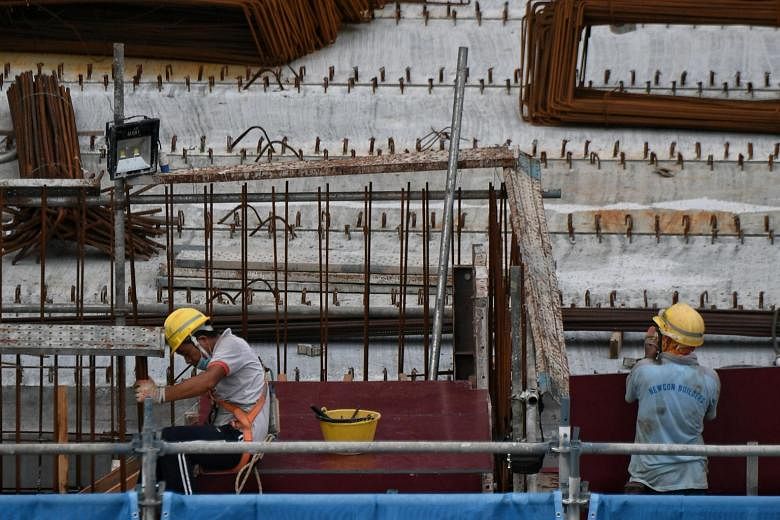SINGAPORE - The waiver of foreign worker levies for S Pass and work permit holders for the duration of their stay-home notice (SHN) period will be extended to the end of the year, said Manpower Minister Tan See Leng on Monday (Sept 20).
This is to help employers bring in workers safely and give them more time to adjust and manage the costs of SHN requirements.
Dr Tan, who is also the second minister for Trade and Industry, added it is also to support the construction sector, which has been badly impacted by the Covid-19 pandemic.
The waiver applies to migrant domestic workers as well. The waiver period was due to end this month.
Dr Tan was speaking at the Real Estate Developers' Association of Singapore (Redas) Mid-Autumn Festival event held at Orchard Hotel Singapore.
Noting that the construction has faced a serious manpower crunch due to the border and travel restrictions imposed, he said: "We heard your struggles and have implemented exceptional flexibilities to relieve the manpower shortages and help businesses preserve core competencies."
For instance, the Ministry of Manpower (MOM) has extended the validity of in-principle approvals for all work pass holders who are unable to enter Singapore, he said.
An in-principle approval is when a work pass holder is approved to work in Singapore but has yet to physically enter Singapore.
MOM had allowed a one-time renewal for work permit holders in the construction sector that did not meet the renewal criteria and waived the minimum period of employment requirement for the man-year entitlement waiver.
On top of foreign worker levy rebates and waivers, companies in the built environment can tap the Jobs Support Scheme and a $1.36 billion construction support package.
Migrant workers living in newly built dormitories here can also expect improved living spaces, including having en-suite toilets shared among fewer people and a cap of 12 residents in each room.
Under current standards, typically 12 to 16 workers share a dorm room, with no limit on room capacity.
The improved standards, which comes after a year-long review, is to enhance the liveability of dorms and to strengthen their resilience against future pandemics, said Dr Tan.
For the construction sector to be more resilient, there is a need to increase productivity through digitalisation and automation, as well as to strengthen the Singaporean core in the workforce, he said.
One project that has adopted digitalisation in all stages of its construction is the Avenue South Residence by developer UOL Group and building contractor United Tec.
The 1,074-unit condominium development in Silat Road in Commonwealth would be the world's tallest building constructed using pre-fabricated pre-finished volumetic construction (PPVC).
PPVC allows building components to be prefabricated in off-site factories and installed on-site and can increase productivity by up to 40 per cent compared with conventional projects.
The pandemic has also shown that it is vital to build a strong local core, Dr Tan noted, urging companies to consider hiring mid-career Singaporeans.
"Jobs in the construction sector have often been associated with the three Ds - dirty, dangerous and demanding. However, the sector is evolving and with this evolution comes many new career pathways that did not exist previously," he said.
These new careers include supervisory production roles, quality assurance and quality control roles, as well as operation management roles, he added.
On Monday, Redas president Chia Ngiang Hong said many construction projects are still facing delays to a varying extent, with many businesses still reeling from the impact of the pandemic.
However, he said there is "general optimism" as vaccination rates gain pace in Singapore and around the region with the sector remaining relatively resilient.
There is more regional focus on green and sustainable developments, he noted, as companies are pushing towards low-carbon and climate-resilient developments in line with the Singapore Green Plan 2030.
"With the Government's continued support to promote investments in green R&D and innovation… there's great potential for the real estate industry to advance green growth opportunities and for the financial sector to play a useful role in (pushing) sustainable and green finance in the region and even globally," he said.


